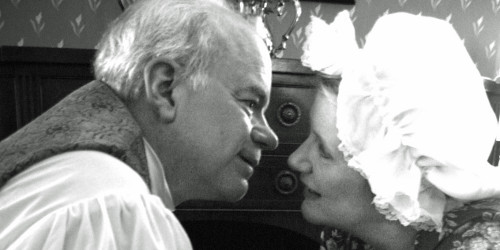By John Quinn

Gary E. Mitchell and Mary Beth Quillin in "My Dearest Friend." Photo courtest of The Snug Theatre
They say that "behind every great man there's a great woman." That truism has seldom been more apparent than in the admirable partnership between John and Abigail Adams. A glimpse into that 54-year relationship is brought to The Snug Theatre by the husband and wife acting team of Gary E. Mitchell and Mary Beth Quillin in "My Dearest Friend."
For those of you who stayed awake in American History class, you know John Adams as first vice-president of the U. S. and our second president – an apolitical man who served only one term because his more aggressive vice-president, Thomas Jefferson, pulled the rug from under him. Unless you have read David McCullough's splendid biography; entitled, not surprisingly, "John Adams," you are probably less aware of the pivotal role of his wife and "level-headed councilor," Abigail.
Michigan playwright Mary G. Kron meticulously researched her project, but was more fortunate than most historians in having primary resources for recreating historical figures. John inherited a farm in Braintree, Mass., but was also a Harvard-educated lawyer. First his law practice and later his government and diplomatic work took him away from home – for months and years at a time. Abigail aptly managed their affairs. They were prolific letter writers – and some 1,200 of them were preserved. Excerpts have been crafted into a sort of dialogue; they are the meat and sinew of this charming play.
Historian Joseph Ellis noted that the letters between John and Abigail "constituted a treasure trove of unexpected intimacy and candor, more revealing than any other correspondence between a prominent American husband and wife in American history." Indeed. Although Abigail was home schooled, she possessed an intellect as sharp as her husband's. She was a thinker far ahead of her time, and her opinions and council figured heavily in John's political philosophy. Consider this quote from one of her letters: "If perticuliar care and attention is not paid to the Laidies we are determined to foment a Rebelion, and will not hold ourselves bound by any Laws in which we have no voice, or Representation." Bear in mind spelling wasn't standardized until that fussbudget Webster published his dictionary in 1828. John and Abigail are a couple you'd like to know better.
The fact that Mitchell and Quillin are married brings a spark of real-life to their performances – there's less "getting into character." Since the source material is written in formal, turn-of-the-19th century language, the delivery is sometimes convoluted, but always well-articulated. Don't bother trying to parse sentences; just sit back and go with the flow.
"My Dearest Friend" is referred to above as a "dialogue," but it's an unusual one. The original exchanges were written, not spoken, and the play is set some time after Abigail's death in 1818. She speaks as a revived spirit in John's memory, and the exchanges, once confined only to paper, can live again.
The couple debate politics, philosophy, animal husbandry, economics – the significant and insignificant details of people separated by circumstance but not by emotion. We hear a little biased opinion about their famous contemporaries: Washington (elevated to sainthood), Jefferson (poseur), Hamilton (hypocritical scum) and Franklin (depraved). There are references to other people and events that are less well known, and therein lay the only snag in this tale.
I have read McCullough's biography and came away from it with the same love and admiration for John and Abigail as the author found in his research. I have the context, then, to identify the topics written about. I know the stories of the various figures. I know, for instance, that Alexander Hamilton suborned members of Adams' cabinet and was instrumental in the president's defeat in the election of 1800. I know the sad stories of their children. But how many others in the audience will have the historical knowledge to understand the circumstances behind their story? Or does it matter?
"My Dearest Friend" is not a history book. It is the intimate story of two extraordinary people that transcends history. That's a tale worth telling.
REVIEW:
'My Dearest Friend'
GEM Theatrics at The Snug Theatre, 160 S. Water St., Marine City. 7 p.m. Thursday-Saturday and 3 p.m. Sunday through June 22. 1 hour, 55 minutes. $20. 810-278-1749. http://www.thesnugtheatre.com










